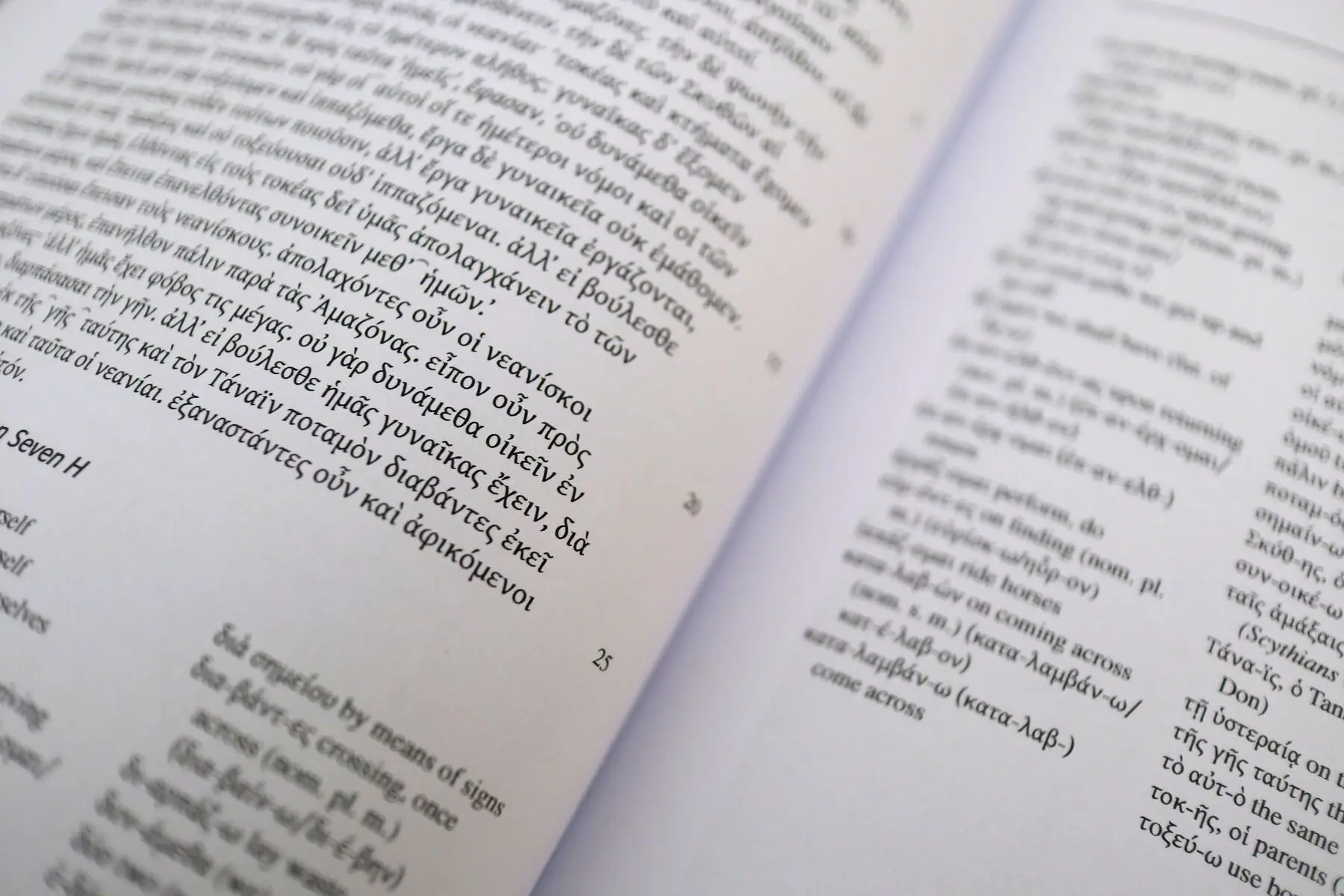JACT’s Reading Greek — Review
Τὸ τὴν Ἑλληνικὴν γλῶτταν ἀναγνῶσαι βοηθείᾳ γραμματικῇ
Reading Greek with grammatical help

This, perhaps rather lengthy text, details my experiences with using Hansen and Quinn's rather grammar-heavy textbook which lead me to consider the usage of a different, more text-heavy book instead. I will be explaining why I believe this is, to my knowledge, one of the better textbooks for learning Ancient Greek and why I have chosen it over H&Q
As you are surely aware, one's opinions can change; occasionally, they may even change rather rapidly and this does, indeed, appear to be the case when it comes to my opinion of this book. Should you wish to read my former statement — wherein I praise this book rather highly —, scroll to the bottom of the page; and I do indeed encourage you to do so, so that you may compare my new opinions and so that you get some context regarding what I am about to say.
After having grinded — ground? — my way through roughly seven chapters of Hansen and Quinn's book, I began to realise that I had learnt a staggering amount of grammar, but had had very little exposure to actual Greek text; and, to make matters worse, the text that I was able to read didn't utilise nearly as many grammatical concepts as I had learnt. This, perhaps not unsurprisingly, lead to my slowly but surely falling into the habit of simply repeating the vocabulary I had already learnt — you know, lest I forget it — instead of actually focussing on reading text, learning new vocabulary and grammar. I was, quite honestly, at a loss; perhaps Ancient Greek was simply beyond my capabilities
I was, and still am, however very keen on continuing my study of the language, but, unfortunately, my attempt at using Hansen and Quinn with Xenophon's Anabasis had proven unsuccessful. To visualise how keen I am on learning the language, I actually spent an additional €150-ish on buying new books that would, hopefully, prove to be much more adequate to actually acquiring the language; and the books I have bought are JACT's Reading Greek
series, as well as the Italian version of Athenaze. These use rather different approaches to H&Q and actually have the student read whole passages of Ancient Greek prose, either adapted from actual texts or completely new stories — or a combination of the two.
The latter of the two, Athenaze, is yet to arrive as it had to be imported from Italy; I had actually ordered this book from a German book-store chain via the book's ISBN and it is supposed to arrive within a few days (as of 23.10.2020) and once it does, I shall create a new page on this website all about it.
The former, however, arrived a few weeks ago and I have made much more rapid progress using this book's method rather than H&Q. This may come as a surprise to you if you have read the text below, praising Hansen and Quinn's book for its focus on grammar and its large
amount of vocabulary and drills; I was, perhaps, somewhat naïve. Indeed, even its number of exercises is rather meagre and especially its actual Greek prose or poetry. Chapter 4, if memory serves right, was the first to include a staggering five (ish) lines of Greek poetry with half of the words being completely unknown to the learner and one was required to check the bottom of the page for help. The exercises, though somewhat plentiful, do not help to alleviate the problem of having too little to read, as they are much too short individually to get used to reading actual Greek prose.
This lead me to consider a different route, namely one that would not only provide me with grammar, but also a large amount of vocabulary and lots of text to read; and this is why I bought the aforementioned books. I must also briefly mention here that having studied roughly seven chapters of H&Q was definitely an advantage, especially when it comes to the nouns and verbs; Hansen and Quinn teaches basically all possible verb forms within just the few chapters, which means that I had already had a good understanding of some basic and some more advanced grammatical concepts of the language when I dove into JACT's Reading Greek. And I must indeed say that Reading Greek is a phenomenal book as compared to Hansen and Quinn.
I am by no means trying to downplay H&Q quality — it is a great book in its own right — but for someone like me who would like to start reading original-ish texts as soon as possible, Reading Greek provides a better framework for actually reading the language than H&Q does. But my opinion has now shifted towards recommending H&Q to people who, perhaps, are intend on studying the language in a more serious, philological and linguistic manner, rather than purely feeling the desire to read old texts. H&Q throws new grammatical concepts at you at a remarkable pace, one that you definitely can keep up with if you're willing to sacrifice the time to actually read texts and learn vocabulary; perhaps using H&Q as your primary source for learning the language would not be as problematic if you had a more flexible time-table (such as at a summer course), but for someone like me — who has a full-time job and school as well —, I believe that Reading Greek is more cost-effective.